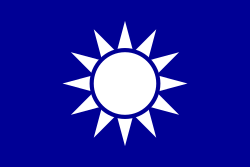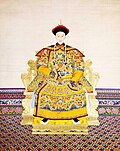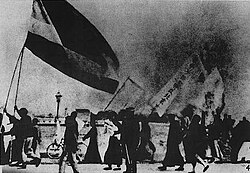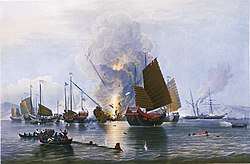Anti-Qing sentiment (Chinese: 反清; pinyin: fǎn Qīng) refers to a sentiment principally held in China against the rule of the Manchu-led Qing dynasty (1644–1912)...
30 KB (3,233 words) - 01:30, 1 June 2025
the anti-Han sentiment is closely related to the anti-Chinese sentiment. The anti-Han policies implemented at the political level during the Qing dynasty...
4 KB (431 words) - 07:18, 27 March 2025
Anti-Japanese sentiment (also called Japanophobia, Nipponophobia and anti-Japanism) is the fear or dislike of Japan or Japanese culture. Anti-Japanese...
97 KB (10,148 words) - 07:42, 25 June 2025
below lists some of these uprisings and important related events. Anti-Qing sentiment Wuchang Uprising 1911 Revolution Some sources claims it started in...
10 KB (220 words) - 22:49, 2 April 2025
Tongmenghui (redirect from Anti-Qing Alliance)
1905, with the goal of overthrowing China's Qing dynasty. It was formed from the merger of multiple late-Qing dynasty Chinese revolutionary groups. The...
13 KB (1,214 words) - 19:36, 23 June 2025
culture to others throughout the world Anti-Qing sentiment, the historical animus against the ruling class of the Qing dynasty Hua–Yi distinction, the historical...
804 bytes (150 words) - 04:22, 26 May 2025
the Qing, some of whom may be motivated by Chinese nationalism and anti-Qing sentiment, argue that the specific actions and policies of the Qing dynasty...
33 KB (4,157 words) - 03:00, 28 April 2025
Anti-Chinese sentiment (also referred to as Sinophobia) is the fear or dislike of Chinese people or Chinese culture. It is frequently directed at Chinese...
128 KB (13,386 words) - 06:07, 23 June 2025
Racism against Asians (redirect from Anti-Asian sentiment)
Anti-Filipino sentiment Anti-Qing sentiment Anti-Romani sentiment Anti-Russian sentiment Antisemitism Anti-Slavic sentiment Anti-Thai sentiment Anti-Tibetan...
19 KB (1,696 words) - 15:06, 26 May 2025
Anti-Russian sentiment or Russophobia is the dislike or fear of Russia, Russian people, or Russian culture. The opposite of Russophobia is Russophilia...
214 KB (20,552 words) - 22:26, 14 June 2025
forces with other anti-monarchist societies in Tokyo, Empire of Japan, to form the Tongmenghui, a group committed to the overthrow of the Qing dynasty and to...
170 KB (16,967 words) - 22:06, 25 June 2025
Anti-Western sentiment has been increasing in China since the early 1990s, particularly amongst Chinese young adults. Notable incidents which have resulted...
30 KB (3,048 words) - 18:30, 6 May 2025
Tungning period when Taiwan was a base of anti-Qing sentiment and Minnan-style architecture was introduced; in Qing dynasty period, a mix of Chinese and Western...
35 KB (3,221 words) - 19:40, 18 November 2024
the Portuguese Republic. In East Asia, China had seen considerable anti-Qing sentiment during the 19th century, and a number of protest movements developed...
75 KB (9,341 words) - 00:54, 26 May 2025
led to a split in the early 1990s, when the New Party was formed by the anti-Lee dissidents in the KMT. After the dissidents of KMT members left, the...
24 KB (2,248 words) - 00:31, 29 May 2025
Modern anti-Japanese sentiment in China is frequently rooted in nationalist or historical conflicts, for example, it is rooted in the atrocities and the...
39 KB (3,859 words) - 08:17, 7 May 2025
China portal History portal Anti-Qing sentiment Mandarin square – costumes of Qing officials Foreign relations of the Qing dynasty Imperial Chinese harem...
157 KB (19,175 words) - 19:48, 22 June 2025
1911 Revolution (redirect from Fall of the Qing dynasty)
positions in the Kuomintang. Many revolutionaries promoted anti-Qing and anti-Manchu sentiments and revived memories of conflict between the ethnic minority...
125 KB (14,422 words) - 22:18, 25 June 2025
submission or hostility to Qing rule. Qing used the term "raw/wild/uncivilized" (生番) to define those people who had not submitted to Qing rule, and "cooked/tamed/civilized"...
198 KB (23,822 words) - 23:49, 24 June 2025
the Qing Empire to keep its territories intact. With the increasing threat from the imperialist powers in the 1910s, anti-imperialist sentiments started...
121 KB (13,005 words) - 05:53, 24 June 2025
Nagasaki incident (category Military history of the Qing dynasty)
stoked anti-Qing sentiment in Japan, presaging further confrontation. The incident is notable for a significant consequence: the cracking of the Qing intelligence...
9 KB (1,119 words) - 19:07, 22 January 2025
List of rebellions in China (section Qing dynasty)
of the Western powers, problems that the ruling Qing dynasty did little to lessen. Anti-Qing sentiment was strongest in the south, and it was these disaffected...
44 KB (6,567 words) - 16:02, 13 March 2025
Democracy in China (section Qing dynasty)
Industrialization gave the West an economic and military advantage. The Qing dynasty's defeats in the Opium Wars compelled a segment of Chinese politicians...
92 KB (10,349 words) - 14:30, 23 June 2025
The Qing invasion of Joseon (Korean: 병자호란; Hanja: 丙子胡亂) occurred in the winter of 1636 when the newly established Qing dynasty invaded the Joseon dynasty...
28 KB (3,264 words) - 00:29, 6 June 2025
as horrific Qing officials may have been derived by the anti-Manchu or anti-Qing sentiments of the Han Chinese population during the Qing dynasty, as...
24 KB (3,007 words) - 09:02, 21 June 2025
Resources in other libraries China portal Sinicization Anti-Qing sentiment Timeline of late anti-Qing rebellions Chinese imperialism Chiangism Hua–Yi distinction...
27 KB (2,810 words) - 04:17, 1 June 2025
internally. Internally, national independence meant independence from the Qing Manchus who ruled China for centuries. Sun thought that the Han Chinese people...
33 KB (3,756 words) - 08:21, 17 June 2025
First Opium War (redirect from First Anglo-Qing War)
a further weakening of the Chinese state's power and legitimacy. Anti-Qing sentiment grew in the form of rebellions, such as the Taiping Rebellion, a...
179 KB (23,128 words) - 18:44, 25 June 2025
members of the Chinese Revolutionary Party were hostile to the Qing dynasty ("Anti-Qing sentiment") and tried to build a nation-state around the Han Chinese;...
17 KB (1,906 words) - 07:53, 11 April 2025
Wang Fuzhi (category Qing dynasty essayists)
associated with Chinese Legalism. Chinese philosophy Confucianism Anti-Qing sentiment Entry on "anti-Manchuism" at p 11, Modern China: An Encyclopedia of History...
9 KB (992 words) - 05:09, 15 December 2024



















